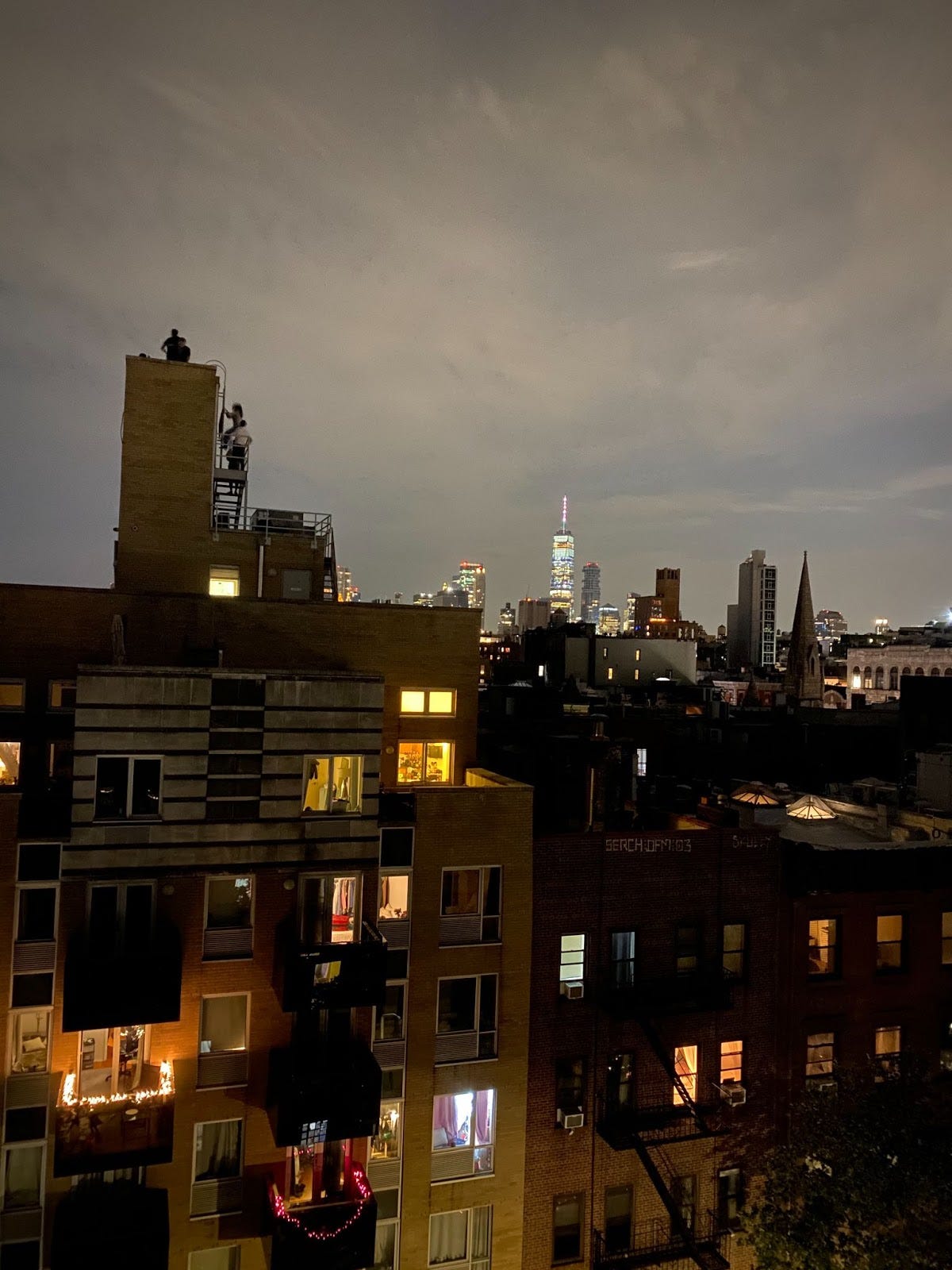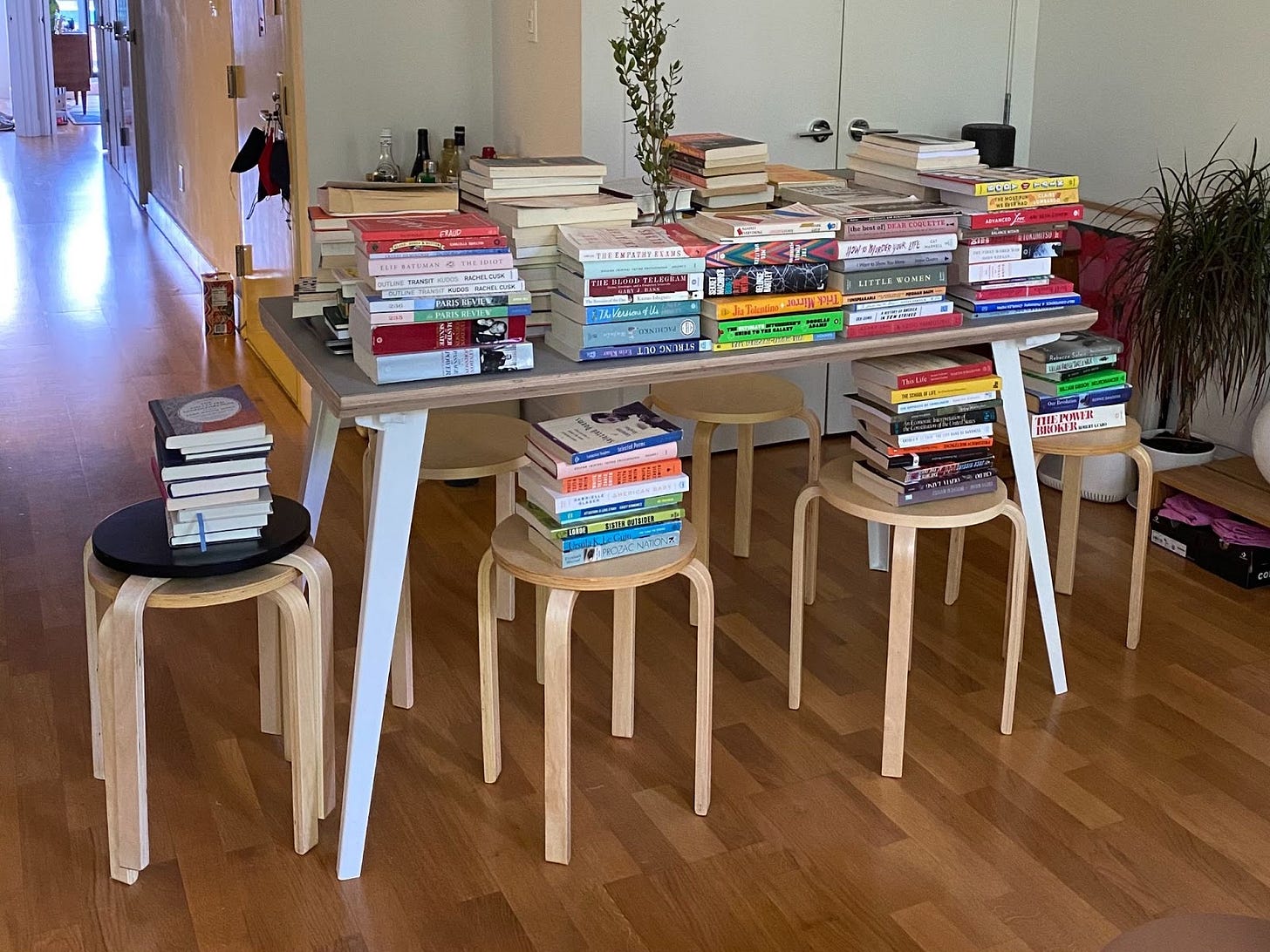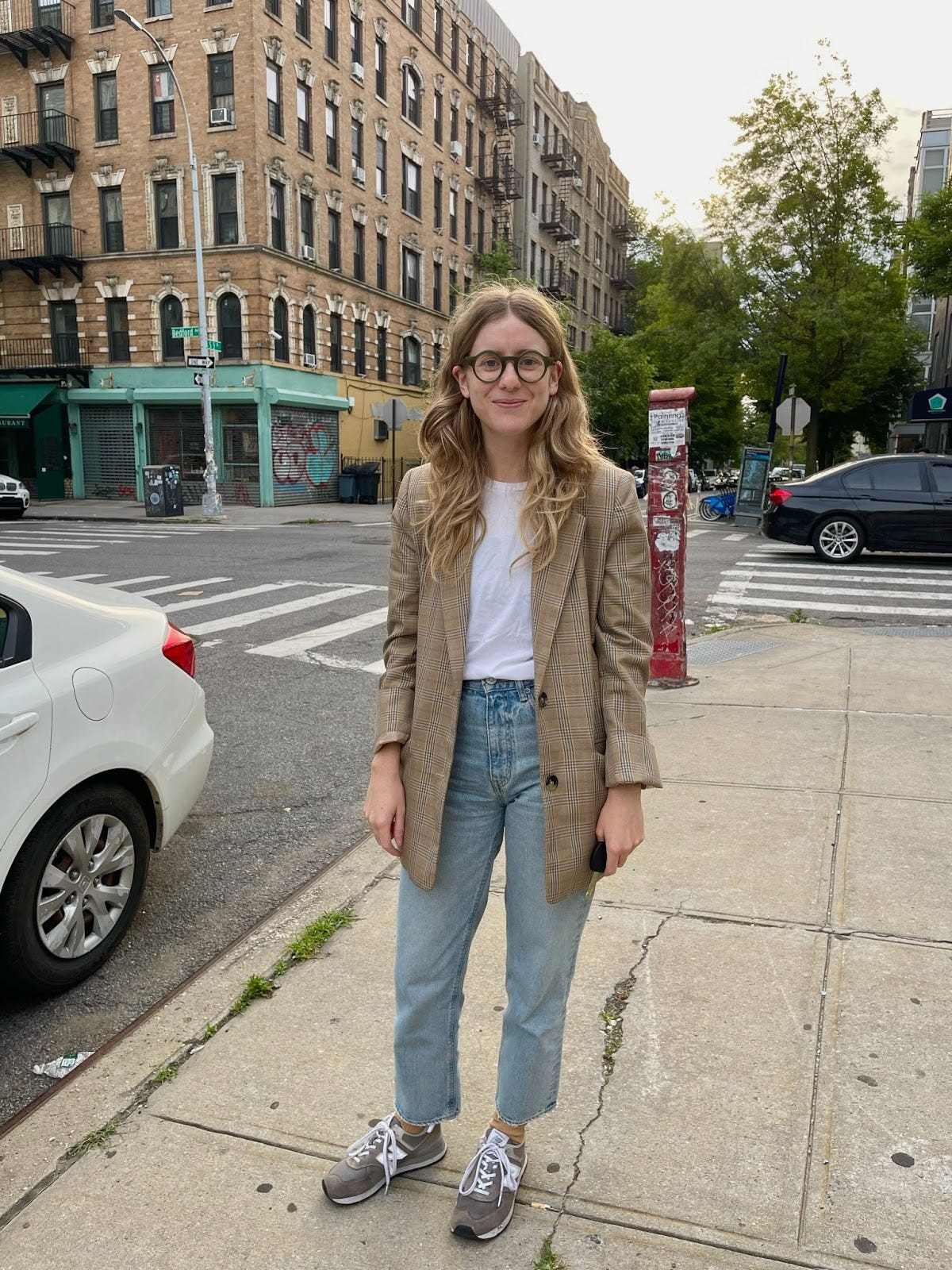#57: Guilty
Maybe Baby is a free Sunday newsletter. If you love it, consider supporting it financially. For $5/mo, you’ll gain access to my monthly Q&A column, Dear Baby, as well as my weekly podcast. Maybe Baby is reader-supported, hence the lack of ads and sponsors. Thank you!
Good morning!
This week I’m opening up comments because I have no idea what the fuck I’m talking about and I want your perspective!
Atonement
A couple weeks ago, I went “shopping in Manhattan” around noon and didn’t get home until the next morning. In a parallel universe, this would be the ideal post-quarantine anecdote. It would track exactly with my dramatic overtures last year about how much I was going to party when this was all over. If only I hadn’t ended the night by typing “ASMR panic attack” into my YouTube search bar.
I’d had the perfect day. I’d bought a pair of denim shorts that didn’t make me want to hide or call my gynecologist. I’d walked around the Lower East Side with a good friend holding an Aperol Spritz to-go. I’d met up with another friend and had chips and salsa in the West Village, before meeting up with her boyfriend at an actual bar, before going back to her apartment so she could do comedy on Zoom (trademark 2021). “Remember the time when I did a comedy show and my friends were in the room on their phones?” she said to an invisible audience as we sat behind her on our phones, glasses of wine between our knees. Later I’d met up with some other friends at Fanelli’s, where the crowd was unhinged in that summer-has-arrived sort of way. We ended the night on my brother’s roof, looking out over downtown Manhattan at 3 a.m., nothing on our faces but the warm air. I hadn’t expected to see anyone or do anything that day except buy mediocre shorts, and suddenly I was texting Avi that I wouldn’t be home tonight. It was ridiculous; the sort of fake Saturday you make up to talk yourself out of getting a dog. And half an hour later, I was laying on my brother’s couch, heart beating out of my chest while a YouTuber from Pennsylvania told me to breathe, that I was safe.
I wasn’t having a panic attack, to be fair. But I did feel anxious—a heightened, aimless flavor of it. The feeling arrived suddenly, right at the end, like a bad twist. And it was resisting my every attempt to squash it. The source, I suspected, was guilt. I felt guilty for spending so much money, for staying out all night, for being reckless and selfish and indulgent. So I was a little drunk and a little high, which didn’t help, but the sentiment was familiar. Beneath the race track of my thoughts loomed the fear that I’d skipped my homework, or told my mom I vacuumed when I’d only picked a few bits of lint out of the carpet, as I once lied (unsuccessfully) at age 13. I had every tool to intellectualize my way out of the emotion—I knew I’d done nothing wrong—and none sharp enough to expunge it.
Guilt is complicated. It’s an ethical tripwire; an alarm that signals our behavior is in conflict with our values. Harnessed productively, it motivates us to reflect, make a change, make amends. But it’s not the most reliable system. Sometimes the wire is too sensitive, or triggered by the wrong red flags. Sometimes it goes off at the wrong time no matter how many times we’ve fixed it. And what do we do with guilt then?
I crept out of my brother’s apartment at 8:30 a.m., my internal alarm ringing in my ears. I walked through the empty, beer-strewn East Village in an old t-shirt he’d loaned me and the aforementioned shorts, several bags hanging off my body. I looked like a cross between a cartoon who’d just gone shopping and a cartoon who’d stayed out all night (both true). I rode the train silently back to Brooklyn and crept sheepishly into my apartment, where Avi was already awake. I told him about my adventure.
“Are you feeling guilty?” he clocked me immediately. “You have nothing to feel guilty about!”
“I know!” I said. I showered and cleaned the house anyway; an inversion of my parent’s edict that I had to do my chores before the fun part. By the afternoon I felt fine, my atonement loop reasonably closed. But the image of me box breathing (4 seconds in, 4 seconds hold, 4 seconds out) on my brother’s couch lingered, like a reminder that some part of my brain is still broken. That I maintain a knack for self-punishment, even after all these essays. As a kid, I did everything to avoid being grounded. At 31, I ground myself.
There is a popular attitude among my cohort that guilt should be rejected. “There is no such thing as a guilty pleasure!” the adage goes. Or “let people enjoy things!” Neither particularly resonates with me. “Let people enjoy things” is less about guilt specifically, but it’s a thought-terminating cliche in the same vein. Both views ask people to withhold critique if it inhibits pleasure, a value system I find dangerous (and which has been satirized in countless dystopian movies).It’s a noble intention—a response to a cruel culture intent on shaming people for being human—taken too far. Just because we should stop feeling guilty about, say, taking rest or eating dessert, doesn’t mean we shouldn’t feel guilty about, say, flaking last minute on a friend, or prioritizing ourselves over all others. The former are functions of capitalism and diet culture, the latter are social precepts. Often, the arguments get flattened and misappropriated.
Of course, guilt itself solves nothing, even if it arises at an appropriate time. As my friend Verena von Pfetten put it on my podcast, the only thing we can control in life is what we do—not how we feel, but what we do. Guilt, then, is only useful if we both understand and agree with its source, and respond to it in kind: by apologizing, or calling for change, or doing better next time, then moving on. Languishing in it solves little beyond satisfying our instinct for self-punishment. But processing guilt is so much more convoluted than deciding whether you agree or don’t. Some beliefs—like say, our worth depending on our productivity, or our lovability depending on our beauty—are so hardwired into us that changing them requires a more active and radical shift. In absence of one, it’s easy to get sucked back in.
>Shame
My onset of guilt after having a nice day is laughably low-stakes. It’s not even a real problem, only proof that my guilt has no bounds or goals, has become almost systemic to my personality via lack of discernment. Maybe it’s no longer guilt at all. Per a 2018 EJOP study about the difference between guilt and shame, “Guilt is indeed concerned with one’s responsibility for a harmful attitude or behavior… [whereas] ashamed people do not focus on responsibility issues, but on the disappointing fact that such fault reveals their defectiveness with regard to their ideal self.” The risk of habitual guilt like mine is that it settles into shame—into a belief in one’s inherent wrongness, no longer tethered to specific actions: I feel bad because I let loose, and I don’t deserve to let loose.
Maybe I’m just forcing my own pathology into a systemic framework (wouldn’t be the first time, baby!), but I don’t think it’s a mistake that our culture’s inconsistent relationship with guilt maps almost perfectly to capitalist goals: Don’t feel bad about watching that show that’s clearly bad for humanity! Do feel bad about taking a vacation from work! We’re surrounded by forces that continually augment an inhuman standard based on work, beauty, sacrifice, purity, balance. The underlying message is that we must change in specific and marketable ways to be valuable: the clear result of a society in pursuit of inhuman goals. And when that starts to make us feel awful, we turn to the spoils of the very framework we resent. I sense a similar pattern in my own life, if you swap out some of the details. Or maybe you don’t even have to.
Could our fraught relationship with guilt as a culture—our spotty rejection and embracing of it—be the result of our inability to commit to ideas that might actually liberate us? We want to love ourselves, but change ourselves, but love ourselves. Certainly I recognize this within myself. It would track that guilt and shame, and by that I mean our relationship with our hypothetical ideal selves, would get tangled up in such a noncommittal ethic. It’s also possible that I’m merely describing the human condition—the endless negotiation of being alive.
Ironically, I’ve been wracked with guilt all week about the looseness of this newsletter. Clearly I’m still thinking it through. Which is why I want to ask you for your perspective. What do you think? Is guilt a present or overwhelming emotion in your life? What makes you feel guilty despite your best efforts, and when do you find guilt productive? To readers who are older than I am, how has your relationship with guilt changed? I’ve found the most problems that “got better” for me with age were less about them disappearing from my life, and more about me getting better at managing them, so I’m curious: How do you manage your guilt?
I’d love to hear your thoughts.
1. “The Future of Loneliness,” by Olivia Laing for The Guardian, the kind of article you send to three people when you finish it.
2. The definitions of concision (being concise) and vertiginous (suffering from vertigo), which both made me go DUH as soon as I read them. Need to channel more child geniuses who break down roots of words in preparation for national spelling bees.
3. This TikTok of a baby getting a shot, which is so much cuter than it sounds.
4. “Connecting on Cameo With Aida Turturro,” i.e. Janice Soprano, by Rachel Handler for Vulture, which made me love Aida Turturro.
5. 1 pint of Haagen Dazs cookie dough ice cream, which I’ve been hunting down for weeks. Bodegas, what kind of conspiracy???
6. Every book I own stacked precariously on our old desk, which we are temporarily using as a table, while our friend Danny installed our new book shelf. Oddly satisfying.
7. 1 live basketball game, between the Brooklyn Nets and the Boston Celtics. My first time inside Barclay’s and I spent most of it squinting at the people in the front row/trying to procure chicken tenders. Go Nets!
8. “The Anxiety of Influencers,” a precise, entertaining, and poignant portrait of internet fame as it exists today, by Barrett Swanson for Harpers.
9. Good vibes, care of this guy:
10. A sandwich and fries from Roll n Roaster, a 50-year-old fast food joint in Sheepshead Bay that made me feel 11 in a good way, which I ate before embarking on a five-hour fishing voyage with the famously low-rated Captain Dave. I didn’t fish but I did take a bunch of photos of a basic sunset.
11. 1 printer. Yes, a printer, purchased for my home, so that I can print things. I plan to use it as least three times this year.
12. “Why Are Some People Punks?” Lauren Oyler’s review of Detransition, Baby for London Review of Books. I haven’t actually read Detransition, Baby, but this made me want to.
13. Bennydrama doing his mom’s makeup for Mother’s Day.
14. Season 2 of Couples Therapy, which further confirmed my obsession with the show. I cried at the end.
15. 1 spontaneous margarita with my friend Elizabeth while I was running errands, who took this photo of me because I looked “so much like Haley,” which I’ve been trying to decipher ever since.
On the podcast this week: All things couples therapy
This week I’ve invited on both a couples sex therapist and a friend who loves going to couples therapy to talk about….couples therapy. And Couples Therapy. Are you following? I’m very excited.
Hope to see you there! Thanks for reading,
Haley
P.s. Several people have asked me now so going to confirm here: If you become a paying subscriber of Maybe Baby, you gain access to the full archive and can cancel at any time.
This month a portion of subscriber proceeds will be redistributed to Transgender Law Center, a trans-led organization grounded in legal expertise focused on community-driven strategies to liberate transgender and gender-noncomforing people.
Give me feedback • Subscribe • Request a free subscription • Ask Dear Baby a question











Haley, I’m punching the air while reading and re-reading this piece!!
After force-withdrawing small ‘vices’ during quarantine (the Wednesday glass of wine out, group dinners with friends), these minor, privileged, pleasures are accumulating into a snowball of guilt. As most, I am my harshest critic, so now a ‘night out’, or big splurge, leaves me with a 24-hour physical hangover, and 72-hour brain hangover.
I’ve talked to a lot friends about guilt and the common response is, "we’ve been locked up for a year, let yourself be!", but I am realizing some (many) things just don’t feel as good anymore.
I read this quote awhile ago relating to guilt, shame, and sin, and it came to mind while reading your newsletter:
David Brooks: That’s a concept from the great theologian Augustine. And he asked the question, what is sin? When we use the word sin now, we only use the word in the context of fattening deserts. But in traditional morality, it’s the sense that we have something broken. And I don’t like the word sin when it’s meant to suggest we’re dark and depraved inside. But Augustine had a beautiful formula. He said, “We sin when we have our loves out of order.” And what he meant by that—we all love a lot of things. We love family. We love money. We love a little affection. Status. Truth. And we all know that some loves are higher. We know that our love of family is higher than our love of money. Or our love of truth should be higher than our love of money. And if we’re lying to get money, we’re putting our loves out of order. And so sometimes just by our nature, we get them out of order. So, for example, if a friend tells you a secret, and you blab it at a dinner party, you’re putting your love of popularity above your love of friendship. And we know that’s wrong. That’s the wrong order. And so it’s useful to sit down and say, “What do I love? What are the things I really love? And in what order do I love them? Am I spending time on my highest love? Or am I spending time on a lower love?”
Maybe extra guilt comes from out of order sins like over-indulging and over-splurging? Anyways, your words really resonated - as always!!
I am also v susceptible to guilt and shame and have been since a very small child.
BUT I do find that it has indeed changed a lot for me and I partly own that to years of therapy, but a lot of it came from living in a different culture then before.
I am Hungarian, which is a very "blame the victim, it's your fault if anything bad happens to you" culture, and I moved to Norway two years ago. Of course people judge each other and themselves here too, but the baseline is incredibly different. Mistakes are accepted as a part of life and trust in each other is normal. If you leave your front door open and you get robbed people will feel sorry for you and not neccessarily think you are an idiot who had it coming (granted, this is mostly true in the countryside, where people do actually leave their houses open all the time).
Most of my colleagues are perfectly fine with making a mistake. People get months of paid maternity and paternity leave off work and noone I know feels guilty about it causing hardship for their employer. Same with illness.
I am writing a novel, but what I want to convey is that I feel like my experience points to the incredibly big effect the culture you live in has on how you feel every day. From what I understand the US is also v focused on individual responsibility and each person having to deal with their hardships on their own (probably even more than Hungary tbh).
Tldr; move to Scandinavia😬